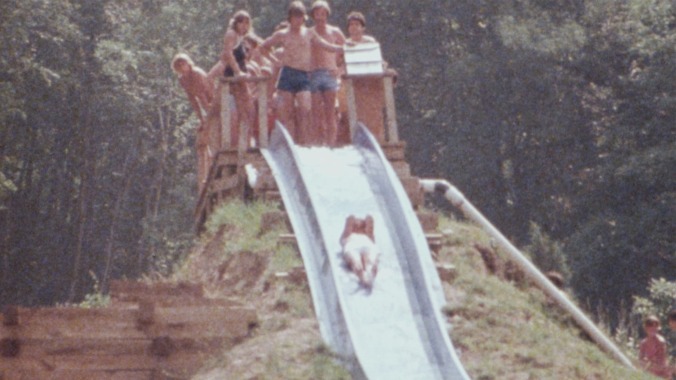Class Action Park memorializes the raddest, deadliest theme park in America

Tucked away in the rolling greens of Vernon, New Jersey sits the Mountain Creek Water Park, a clean and responsibly run day-trip destination catering to families in the Tri-State area. But in its ’80s heyday—and for two brief years in the 2010s, as part of an ill-fated nostalgia ploy—this facility was known as Action Park, revered far and wide as a teenager’s haven with no rules or safety regulations to get in the way of fun. The go-karts slammed into one another at whiplash velocities, an alpine-style slide sent sleds flying off course, and one sheer-drop water chute simulated the experience of an enema on all its riders. Adolescent staffers spent their on-the-job hours sleeping, boozing, blazing, sneaking off into the utility shed for a coworker quickie, and maybe occasionally monitored an attraction. For employees and patrons alike, this was what “raddest summer ever!!!” stories were made of.
Class Action Park, the latest feature-length documentary to attempt a more vivid and personal take on a particularly colorful Wikipedia page, memorializes those salad days of skinned knees and laissez-faire parenting. In selected clips from late-night appearances, Johnny Knoxville, Jimmy Kimmel, and other celebrities too famous to appear in the film proper rave about how this wondrous, occasionally lethal place had to be experienced to be believed. (For the actual talking-head segments, we get such likable C-listers as Chris Gethard and Alison Becker.) It’s enough to make one pine for a more visceral representation of the material than the tape-warped videocassette footage, animated interludes, and wistful soundbites can manage. Except that movie already exists: It’s called Action Point, Knoxville made it in 2018, and like its nonfiction twin, it’s a pale consolation for those of us too late to pay a death-defying visit—though at least that one allowed us the pleasure of human bodies incurring authentically grievous damage at high speeds.
Morbid-minded audiences in search of a Roar-esque compilation of jaw-dropping footage featuring real people enduring real harm will be out of luck. Directors Chris Charles Scott and Seth Porges take a book-report tack that only feels rowdy and irreverent relative to the buttoned-up standard of documentary. The really grisly stuff didn’t get caught by any amateur lenses, leaving small-time comedians and former personnel to tantalize us with anecdotes and folk legends we can only imagine.
Those wild recollections do curl the toes, though. Then-owner Eugene Mulvihill, a Reagan-era Wall Streeter who brought that milieu’s “deregulate and let God sort ’em out” philosophy to kiddie entertainment, conceived his playland as something between Xanadu and an Evel Knievel event. “Uncle Gene” paved the main drag with heat-absorbing black asphalt that resulted in a unique medical condition termed “chopped meat feet” for anyone without flip-flops. Scrapes would be disinfected with a mysterious orange spray, a treatment so painful that anyone able to endure it without writhing out of a small white circle painted on the floor got a prize. To test out his physics-flouting amusements, Mulvihill would slip one of the high schoolers on his payroll a crisp hundo and hope like hell that they came out the other side in one piece.
And while it qualifies as a minor miracle that more people didn’t die, some did. The good times screech to a halt when the film remembers we have laws governing thrill-ride construction for a reason. The directors duly include testimony from one casualty’s family, who have less-than-fond memories of Action Park as the well-funded institution that did everything to avoid claiming responsibility for a boy’s death. Turns out “Uncle Gene” could be a real A-hole, stiffing every fine he received and quashing lawsuits by forcing long, expensive trials for ordinary citizens unable to afford it. (If that sounds like Trumpist doctrine, it may not surprise you to learn that Mulvihill was buddies with the current commander-in-chief, who opted against investing in the property.) The legal and money troubles all caught up to him just as the ’90s hit, and parents started keeping a slightly closer eye on their offspring.
That provides the concluding minutes an uncomfortable ambivalence that’s out of sync with the film’s otherwise affectionate beers-around-the-campfire atmosphere. As Gethard and Becker explain, the good ol’ days could be pretty messed up at times, but damn if they weren’t the best; the somber tone struck in the back stretch feels like lip service, hollow and obligatory. The essence of this project was always going to be a look back on the sickest getaway in Jersey’s illustrious history. For all its attempts to build itself into something more substantive, it’s still a day at the theme park.